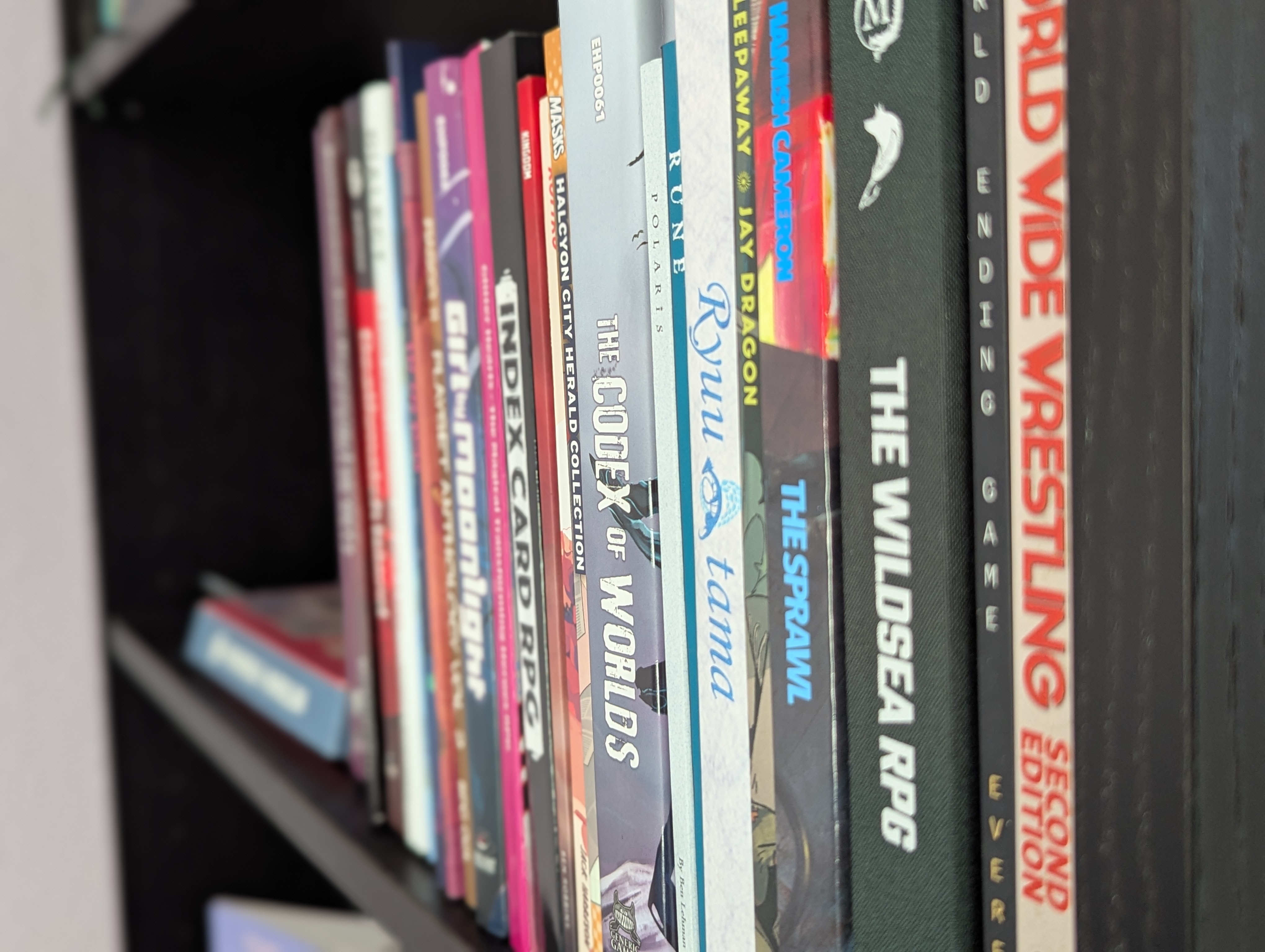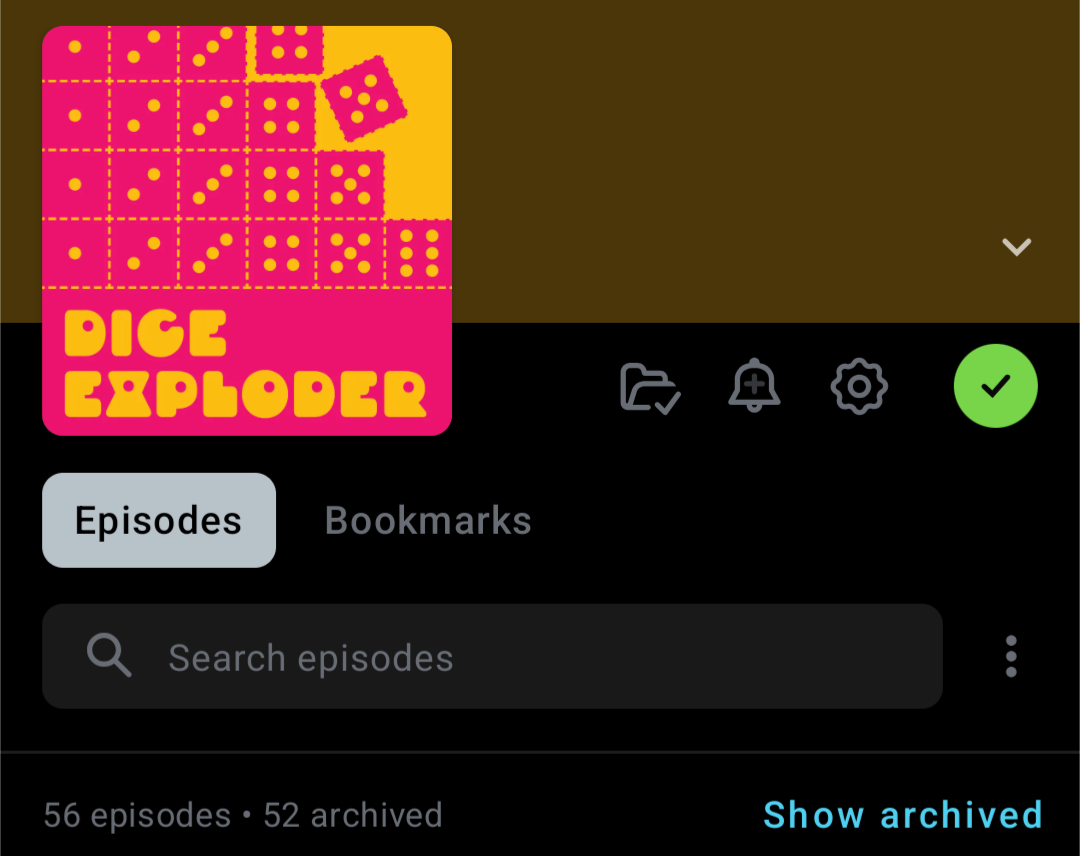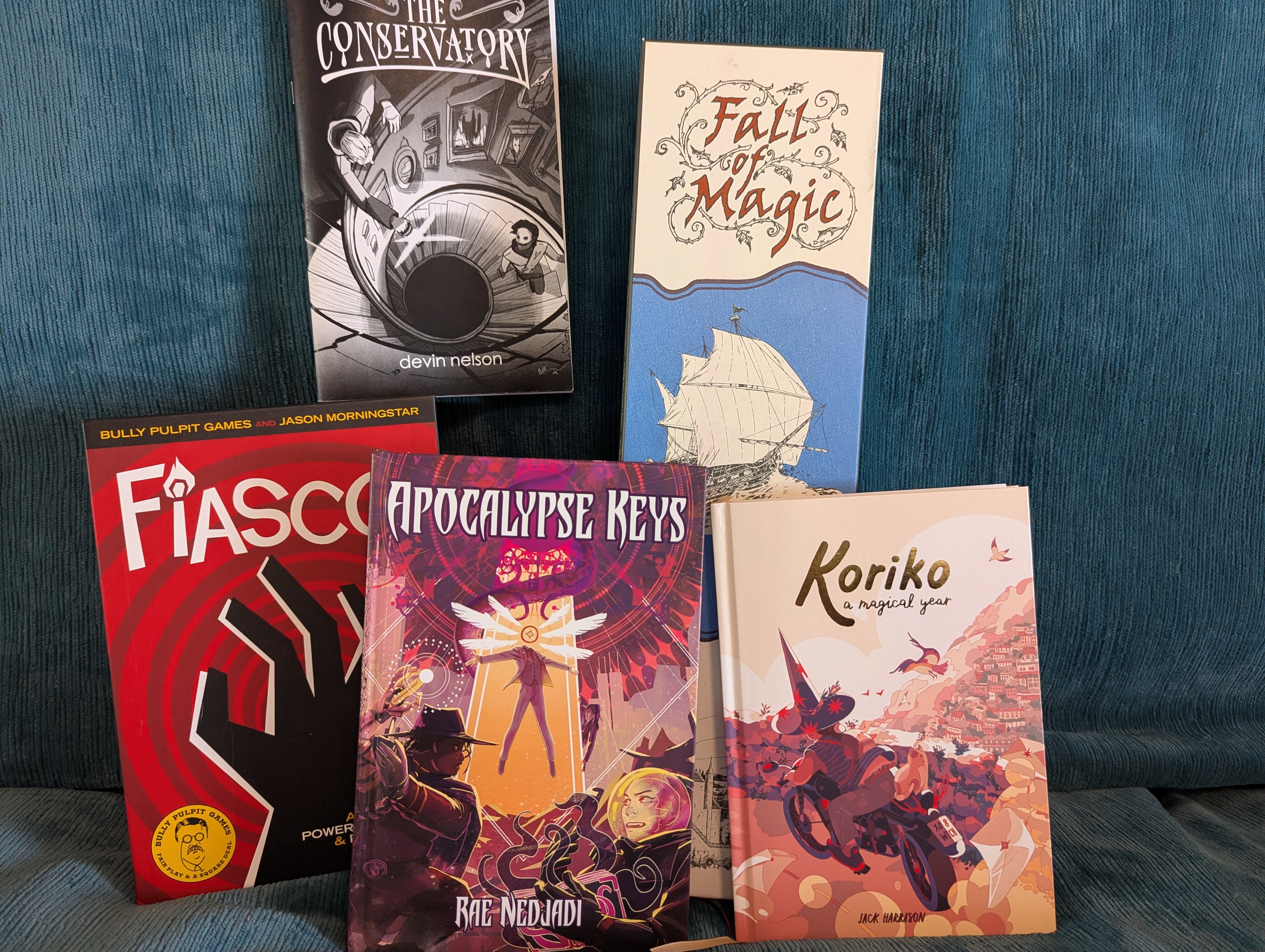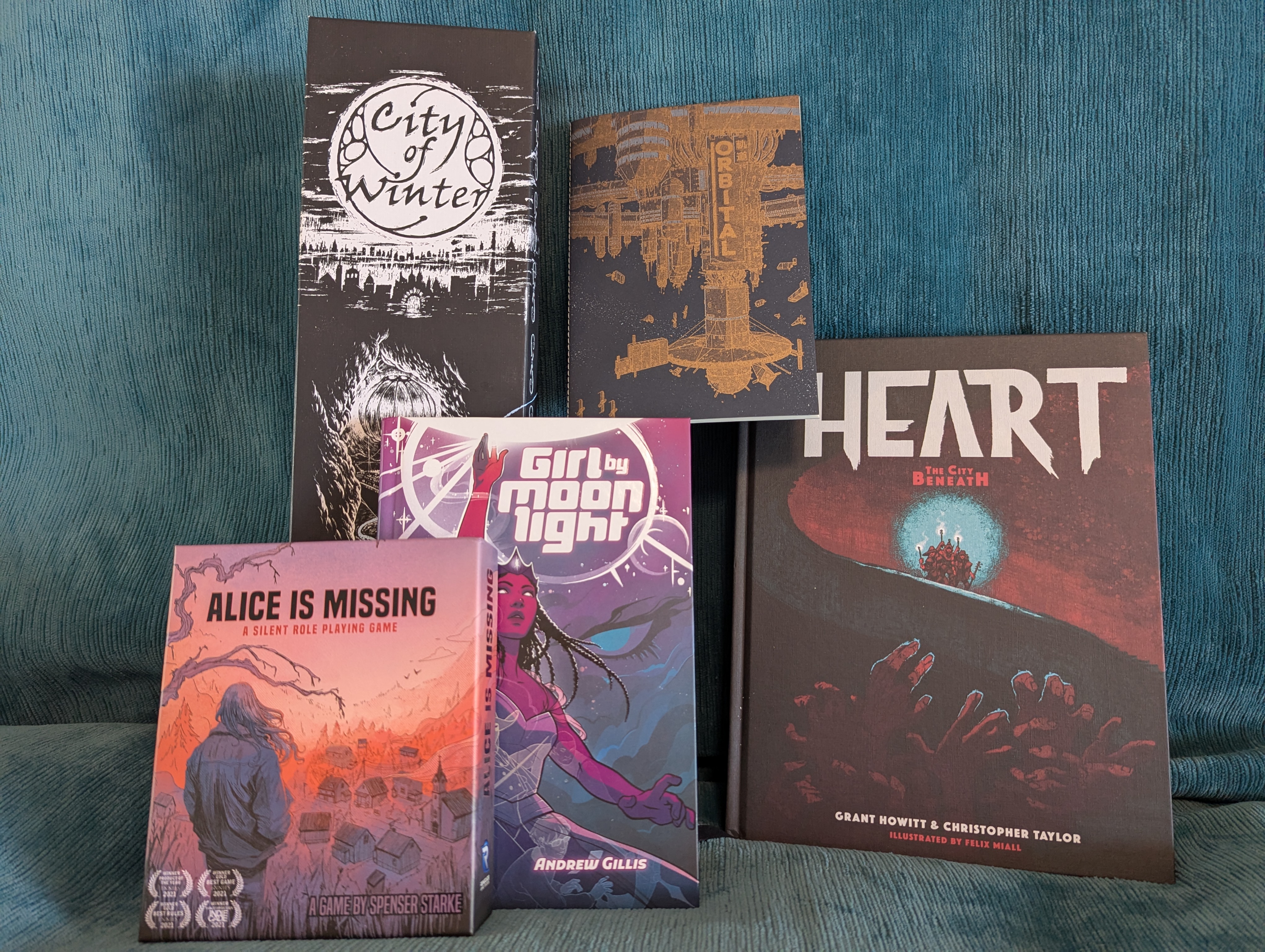
2024 has been a year of firsts for me with tabletop role-playing games, a hobby and art form that’s become increasingly important to me over the past 6 years or so. I took a class all about worldbuilding in TTRPGs that was endlessly inspiring and enlightening. I attended conventions dedicated to the hobby. I got to approach a few particular games for the first time as a player rather than a GM. It was also my first year exploring the communities around TTRPGs, playing a lot more with strangers and making new friends along the way. I even started working on my own game design projects and even released a few small ones, with hopefully more to come.
Those following along might know that this is also the first year I turned this very blog towards TTRPGs alongside video games. I’m still building the relevant critical muscles and learning how to follow the space and its communities, and although I did technically play a modest assortment of games that released in 2024, I don’t feel equipped to give a big overview. And beyond what I’ve played, I have dramatically less confidence that I’m playing TTRPGs "well" or "correctly" than I do with video games, meaningless as those notions may be. I shouldn’t let this quell my desire to opine critically, but it gives me pause more than I’d like.
So instead of a Top Some-Number of 2024 like I typically do with video games, I’m going to follow a different format for reflecting on my year in tabletop RPGs: a bunch of silly made-up award categories, picking up the buck from Thomas M’s Games of the Year 2024 post from earlier in the month. Starting with, as it turns out…
Favorite Blog: The Indie RPG Newsletter
I read slowly and skim inefficiently, so I’m not great at organically keeping up with critical discourse, new releases, and the general glut of cool stuff going on in the various indie TTRPG spaces. What helps me most is a thoughtful roundup of interesting new games, insightful reviews, and game design blog posts and essays from around the internet — and the best place I’ve found to get it is from The Indie RPG Newsletter, by the aforementioned Thomas M. Not only does each newsletter contain a great collections of links, but it also opens with a little bit of anecdote, play culture noodling, design analysis, or some such thing to set the tone and give the blog its personality. These intros are frequently thought-provoking and endearing while always being bite-sized and straightforward. Thomas M has been at this a while now and he’s clearly honed this newsletter to a wonderful balance of warmth, breadth, and brevity.
Favorite Podcast: Dice Exploder
This year, I started a few RPG design projects of my own. It’s been a rewarding and introspective exercise: unravelling a decade or so of creative stagnation to discover if maybe I could write and design things that aren’t software. The RPG space is vast and amorphous (and imposter syndrome comes for all of us), but there has been no better salve than Dice Exploder, a podcast about dissecting RPG mechanics and the play experiences they produce. Host Sam Dunnewold is full of energy and curiosity but always committed to spotlighting his guests and bringing interesting conversations into focus — especially when he occasionally comes out swinging with a contrary opinion. The format of the show has guests bringing their own favorite mechanics for show and tell, which means it’s chock full of cool game designers talking about a other cool game designers’ work. The show is equal parts celebratory, analytical, and reflective. Whenever I felt creatively stuck, it’s invigorated and motivated me to work at my own projects and find new ways forward. Not only that, it’s been a wonderful magnifying glass on games I love as well as an excellent recommendation engine for games I didn’t know.

Favorite Game With a GM: Apocalypse Keys
Apocalypse Keys was the pretense for assembling a new group of players, old friends with whom I wanted to better stay in touch. The ame invites a lot of player input beyond the boundaries of PC roleplay, which eased the process of rebuilding my game master instincts while also giving players a chance to show me just how creative and clever they were. Apocalypse Keys is also special because it inspired my first crack at writing about TTRPGs, something I hope to continue in the coming year. You can read it here: Apocalypse Keys Wants You to Fill in the Gaps
Favorite Game Without a GM: Fall of Magic
I had a delightful time playing through Fall of Magic in a few big chunks across 2023 and 2024. It’s a game that inspired much of my own RPG design thinking and gave me plenty to consider regarding play culture and the social and emotional demands of various game formats. I wrote quite a bit more about it here: A Lot From A Little in Fall of Magic.
Left on Read: Girl by Moonlight
In addition to exploring design communities and conventions, I tried to make a point of reading more RPGs this year. In September, I made a big dent in my pile of “unread” games, and it helped broaden my gaming lexicon and hone my own design ideas. Among these newly “read, but not played” is Andrew Gillis’ Girl by Moonlight, a game about magical girls resisting forces of oppression and violence. In addition to some smart mechanical twists on top of the Forged in the Dark system, Girl by Moonlight dedicates a sizable chunk of its pages to four distinct “series playsets” that help players build settings around focused thematic ideas with directly-stated influences.
A recent social media discussion about how TTRPGs use genre had me thinking more about Girl by Moonlight again. It’s thoroughly suffused with genre, both as an exploration of the breadth of magical girl fiction and a celebration of several of its precise, iconic works. While some would describe “magical girls” as more of a “trope” than something as expansive as a “genre”, Girl by Moonlight insists that “magical girls” can be broadened into a set of shared themes around gender, relationships, and societal positioning. I’m no expert on magical girl fiction, but I love how this game sets out to to exemplify both its multitudes and its most distinctive qualities. I kept meaning to put a group together for it, but it was one more thing that fell by the wayside. Hopefully next year!

It’s Complicated: Koriko: A Magical Year
I’ve had intermittent interest in solo RPGs for years, but this year I finally started to understand my own taste. Koriko: A Magical Year, is a solo RPG by Jack Harrison that’s spread across distinct chapters, driven by a slowly morphing collection of mechanics involving tarot decks and dice towers, all telling the story of a witchy teen protagonist as they leave home for a magical big-city adventure. It’s a gorgeous game, packed to the brim with lovely art and some of the most charming writing I’ve seen all year.
I… also didn’t get very far into playing it. Two chapters in, I found myself mired in the specificity and increasing mechanical detail, struggling to answer prompts with enough brevity to keep a healthy pace, and struggling to maintain any momentum. I came to realize that my preference in solo RPGs is for simplicity: my favorite solo games are intensely spare and straightforward little games that lean heavily on oracles and generate very little friction from needing to read along as you play (Healer by Tamsin Bloom and Alone Among the Stars by Takuma Okada are some favorites).
I appreciate Koriko for all of its lovely writing and art, and I do think the systems that it uses to tell its story are capable and compelling. But I also appreciate it for helping me untangle my own tastes — even if it was a casualty thereof. And despite this, Jack Harrison’s body of work continues to excite me: Artefact is another solo game that functions as a spectacular worldbuilding muse, I’ve wanted to play Orbital for ages, and I’m excited to read more of his backlog too.
Gets Me Every Time: Fiasco
My regular home group doesn’t play many games more than once. Our long-running D&D 5e campaign takes most of our time, with shorter campaigns and oneshots filling space between story arcs or covering for a missing player or two. There are so many games out there that I rarely find occasion to return to any particular game. One of the rare exceptions is Fiasco, by Jason Morningstar. It’s the very first GM-less game I brought to this group and it remains a stalwart favorite. Earlier this year, we played a game using The Devil’s Lettuce by Endwalker, a community playset designed for ridiculous stoner comedies. We stumbled our way through an unhinged story about alien abductions, secret military facilities, and weed that gives you telekinetic powers. It was almost certainly the stupidest story we’ve ever told together. It was so much fucking fun.
A VTT Can Be Cards and a Google Doc: The Conservatory
The Conservatory is a collaborative worldbuilding game by Devin Nelson about creating an occult institution and chronicling its rise, trials, and legacy. It uses a tarot deck to drive its story and has an overall structure influenced by The Quiet Year, where turns revolve around answering card-driven prompts and then performing a chosen action. I pitched it to my Apocalypse Keys group as an interlude game when I ran out of prep runway, and as much as I loved reading through it, I really wasn’t sure how it would land.
Well, it was a hit! The Conservatory was a wonderful way to draw in friends who were relatively new to worldbuilding games, giving them both specificity to latch onto and latitude get elaborately weird. Our three sessions produced a huge document full of absurd characters and plot machinations. One player told us that his attempts to describe the game to his partner felt like failing to explain a wildly complicated inside joke; our conservatory’s story was dense with silly comedic bits, but always retained a sense of occult horror and conspiratorial drama. The Conservatory delivers a lightweight but effective framework, and it’s an easy recommendation for anyone looking to explore more worldbuilding games.

What’s Next
2024 was a rewarding year of digging deeper into TTRPGs as a player, learner, practitioner, and community member. I can think of ways I might have directed my time or attention differently, but all told, I can’t believe how many positive and memorable experiences I got out of it.
I don’t feel compelled to bring any particular goals into play here for next year, but I hope to write at least four or five pieces about TTRPGs, in addition to reading more of the long-form games that have accumulated on my shelf. Beyond that, here’s a manageable list of games I really want to make time for in the next year:
- Girl by Moonlight by Andrew Gillis
- City of Winter by Ross Cowman
- Alice is Missing by Spenser Starke
- Heart: The City Beneath by Grant Howitt & Christopher Taylor
- Orbital by Jack Harrison
We’ll see how I do… if you would like to play something with me next year, please reach out!